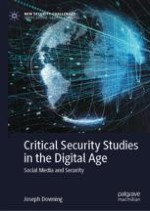Abstract
This chapter examines the question of critical approaches to terrorism and social media, literature on terrorism and social media. The work on the electronic jihad (Laytouss,
2021; Prothero,
2019) and right wing extremists (Davey & Weinberg,
2021) is vital in substantiating the importance of social media platforms in questions of terrorism. However, there is much further to go especially in the light of the critical terrorism studies’ approach that has emerged in the last decade (Gunning,
2007; Herring,
2008; Jackson et al.,
2007). This is especially true of the critical terrorism that considers the leaching of “terrorism” into many aspects of daily life (Breen Smyth et al.,
2008). Of particular interest from the constructivist perspective for social media are the observations that terrorism has become the subject of a range of popular culture products, including TV shows (Erickson,
2008; Holland,
2011) and comic books (Veloso & Bateman,
2013). Thus, terrorism becomes a broader cultural artefact that blends in with a range of other themes and questions that go far beyond the obvious questions of counter terrorism. To further this work, however, requires taking seriously the integration of sociological approaches into security studies advocated by the Paris school (Bigo & McCluskey,
2018).
The two examples used here are of Twitter responses to a threat to attack Marseille, and in the wake of the Manchester bombings both offers insights into the range of various ways the local context can play a role in constructions of terrorism, and indeed a role in resisting discourses of terrorism. In the case of Marseille, city landmarks, as well as the crime and violence within the city, were themes used by social media users to resist the ISIS threat to the city. In Manchester, a different process occurred where social media users used the local context, its Muslim residents and their acts of kindness in the aftermath of the bombing to resist narratives around Muslims in the UK being synonymous with terrorism. Additionally, in both contexts sport, and in particular football, featured in different ways in these discourses of resistance. In Marseille, as well as the themes of the local city landmarks and crime being subverted, so were the themes and discussions of the local football team. In Manchester, the team’s symbols were not used per se, but a team fan account on Twitter was central in spreading narratives about Muslims being important in helping in the aftermath of the attack.
